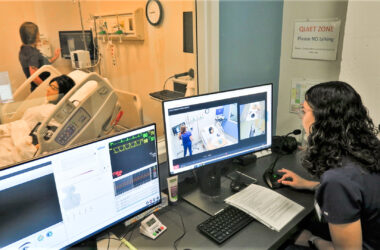The Oregon Health Authority is bringing in 112 out-of-state registered nurses and respiratory therapists to help the state’s two largest children’s hospitals.
Oregon Health & Science University’s Doernbecher Children’s Hospital and Legacy Health’s Randall Children’s Hospital, which are both in Portland, asked the authority for help to cope with a surge of patients sickened by a respiratory illness known as RSV, respiratory syncytial virus.
The illness typically affects children but many did not become infected during the past three years because they wore masks or avoided contact with strangers. Now that pandemic restrictions have been largely lifted, the virus is spreading rapidly, putting dozens of children into the hospital.
Dozens of children are in Oregon hospitals with RSV, including some in intensive care. Combined with other medical needs, it eats into the supply of hospital beds. This week less than 20% of the state’s 554 pediatric beds were free, and only four pediatric intensive care beds were available.
The authority is bringing in the staff through a contract with AMN Healthcare, a California-based staffing company, that began in 2020 when hospitals were swamped with COVID-19 patients. That contract and others were used to bring in many more professionals, often more than 1,000.
But the need now is less acute, Jonathan Modie, a spokesperson for the Oregon Health Authority, said in an email.
State officials expect the professionals to start arriving next week.
The contract requires the professionals to come from out of state. The health authority did not say what states they will come from.
Doernbecher requested 59 registered nurses and 16 respiratory therapists and Randall asked for 27 registered nurses and 10 respiratory therapists, according to the authority’s records. Those figures are preliminary and could change, Modie said. They’ll primarily work in the pediatric units.
The contract professionals will work full time, most likely 36 or 48 hours a week, though that depends on the facility’s needs, Modie said. Health authority officials anticipate the nurses and therapists will work at the hospitals for at least four weeks.
The initial cost, which will come from state general funding, is estimated at $4.65 million, Modie said. State officials are still working to determine what share, if any, the hospitals will cover.
Health authority’s role
“We are pulling out all the stops at least for these children’s hospitals to start with,” said Dave Baden, chief financial officer of the health authority, in an interview with the Capital Chronicle. “One of the tools that we used a lot in the pandemic was executing contracts for extra staffing. So we’re going back to do this in a very short term.”
Baden said that before the pandemic, the health authority would have been slower bringing in contract professionals.
“It would have taken us months to get something like this in place,” Baden said. “We now have the relationships with staffing firms, they understand how we work, how our billing works, and we can execute things much more rapidly,” he said.
The workers could start arriving on Monday, said Eric Gebbie, director of emergency operations at the authority.
The authority orders the workers from the staffing agency following hospital requests. They are not state employees.
Numbers can be fluid, and staff can come and go depending on the length of their assignment and how long they want to work in Oregon.
“Some people want to come to Oregon and go home for Christmas,” Gebbie said. “Others are happy to take a 12-week assignment, otherwise they don’t want to travel.”
Hospital requests
Public records of the requests sent to the authority in mid-November show the hospitals plan to put them in different pediatric units.
For example, OHSU initially requested 59 registered nurses: 20 for its pediatric intensive care unit, 20 for its pediatric emergency department, six for its neonatal intensive care unit, 10 for its pediatric medical and surgical unit and three for its pediatric intermediate care unit.
In its request, OHSU said any level of help would help. When asked for details, a hospital spokesperson said the logistics are being worked out.
“There are health care staffing challenges which were exacerbated by the pandemic, and we continue to admit a high number of patients,” Nicole Rideout, a spokesperson for OHSU, said in an email. “Additional staffing resources help ensure we’re able to manage this surge, while also continuing to provide care to all children who may need it. Unfortunately we don’t have clarity on the exact numbers yet as the logistics are still being worked out.”
Public health authority records show Legacy requested 12 acute care registered nurses and 15 for its pediatric intensive care unit.
Elizabeth Baker, a spokesperson for Legacy, declined repeatedly to say how the contract workers will help the hospital’s operations.
“Discussions are ongoing for additional assistance and we will know more in the coming days,” Baker said in an email.
Oregon Capital Chronicle is part of States Newsroom, a network of news bureaus supported by grants and a coalition of donors as a 501c(3) public charity. Oregon Capital Chronicle maintains editorial independence. Contact Editor Lynne Terry for questions: [email protected]. Follow Oregon Capital Chronicle on Facebook and Twitter.
STORY TIP OR IDEA? Send an email to Salem Reporter’s news team: [email protected].

Ben Botkin - Oregon Capital Chronicle
Ben Botkin covers justice, health and social services issues for the Oregon Capital Chronicle. He has been a reporter since 2003, when he drove from his Midwest locale to Idaho for his first journalism job. He has written extensively about politics and state agencies in Idaho, Nevada and Oregon. Most recently, he covered health care and the Oregon Legislature for The Lund Report. Botkin has won multiple journalism awards for his investigative and enterprise reporting, including on education, state budgets and criminal justice.









